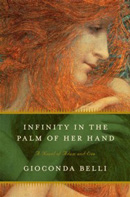

Harper Perennial, paperback, 9780061673658
I love retellings of popular stories (fairy tales, the King Arthur legend, fables), love venturing into familiar territory in an unfamiliar way, seeing how an author can give a voice to characters previously on the sidelines. In Infinity in the Palm of Her Hand, Gioconda Belli tackles the story of Adam and Eve, focusing not on the accomplishments of a Creator, or the machinations of a Serpent, but on the thoughts and experiences of Christianity's first man and woman.
One of the strengths of Infinity in the Palm of Her Hand is that this is not the Eve of Milton's Paradise Lost, a woman who is the downfall of humanity, the cause of original sin. Belli's Eve is responsible for giving us freedom and purpose. Rather than laze in the Garden day after day, Eve wants for her and Adam to "initiate history, do what they had been created to do: they would found a species, they would people a planet, they would explore the limits of consciousness and reason". In Belli's version of Genesis, woman is not the reason we suffer and die, but the reason we thrive.
Rather than focusing on life in Eden, the majority of the novel relates the events that occur following expulsion from the Garden. The reader watches as Adam and Eve first experience sex, death, and childbirth. We get the story of Cain and Abel, complicated by the fact that Adam and Eve also have two daughters, Luluwa and Aklia. Humanity's first murder occurs out of jealousy, and Cain's impulsive actions mirror his mother's instinctive decision to eat the Fruit of the Tree of Knowledge. However, while Eve's action ultimately brings about the growth of humanity, Cain's violence causes destruction. In Belli's world, it is not woman who destroys, but man.
Winner of the 2008 Sor Juana Inés de la Cruz Prize, Infinity in the Palm of Her Hand is a beautiful translation.
Belli's prose is at times rhythmic and sharp, and at others ornate and measured. Eve's inner thoughts seem realistic, as if this
is the way the first woman really would think. She is not merely a flat stereotype, but a complex character with whom all women—whether
religious, or, like this reviewer, not—can relate.
